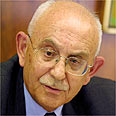
Report: State should recognize Bedouin villages
Committee for Regulation of Bedouin Settlements in the Negev presents housing and construction minister with its findings, says Israel must change legal status of at least 46 villages so to 'prevent perpetuation of community's unbearable state'
The Committee for the Regulation of the Bedouin Settlements in the Negev, headed by retired Supreme Court Justice Eliezer Goldberg, presented Housing and Construction Minister Ze'ev Boim with its findings on Thursday.
The committee's report urged Israel to recognize about 46 villages, which house approximately 62,000 Bedouins.
Goldberg noted that the State should give legal standing to the villages, adding that the residents could ask to have their community relocated to the northern Negev. "Recognizing these villages would prevent the perpetuation of their unbearable state," he said.
The committee further called on the government to find a fair, logical solution to the various disputes surrounding the allocation of land within the Bedouin settlements, in order to reaffirm the sector's faith in the State and facilitate their integration within the Israeli society.
Solution must be found
As for the illegitimate construction in the Negev, the committee said that there are 50,000 illegal buildings in the area to date, and about 1,500 to 2,000 more are built every year. The committee suggested redefining the legal stats of some of the structures, providing they so not harm the State's construction outline for the area.
Mitigations aside, the committee recommended implementing a "hardline enforcement" approach to any future infractions.
The Committee for the Regulation of the Bedouin Settlements in the Negev, which was formed in October of 2007, also recommended forming an independent, public corporation to monitor the regulation of Bedouin settlements.
Other recommendations included giving incentives to Bedouins who serve in the IDF, in order to increase the motivation to serve within the community, and strengthen its bond with Israel; as well as offering monetary compensation in case of relocation.
"The Bedouins residing in the Negev are not illegal aliens they are citizens of Israel and as such have rights, as well as obligations," said the Goldberg Report.
"Time is running out as any further delay in finding a solution to the Bedouin settlement in the Negev may cause irreversible damage for generations to come."
Goldberg further stressed that despite a High Court ruling saying the Bedouins claim to the land is not proprietary, but rather that of residential tenure, the government must consider the community's historical ties to the land and allot it some right to it.
'Making a mountain out of a molehill'
Interior Minister Meir Sheetrit welcomed the report's recommendations: "This is big step towards finding a solution for significant issues in the Bedouin sector. I hope the report's implementation will be swift."
Sheetrit added that he intends on asking Prime Minister Ehud Olmert present the report to the cabinet before February's general elections.
Shmuel Rifman, chairman of the Ramat Negev Regional Council of and head of the Negev Development Authority, was disappointed at the report's recommendations: "We had high expectations of the report, but at the end of the day it made a mountain out of a molehill.
"We expected the committee to actually regulate the Bedouin settlements in the Negev, but all we got was a bunch of papers leaving the decision up to the government.
"This is not the way to create communities. This way is a guaranteed failure. We missed the chance to resolve this issue," he concluded.
Omer Mayor Pini Badash called the decision to recognize dozens of Bedouin settlements "miserable": "This is a miserable decision which will undoubtedly hinder the rule of law, encourage hooliganism and increase the problem of illegal construction in the Negev."
Yisrael Beiteinu Chairman Avigdor Lieberman added that the decision "forms a dangerous precedent and is against the law. It is inconceivable that the incompetence of leaders in recent years would lead to the conclusion that all we can do now is agree with an existing situation. The government must reject the report's recommendations."
'Land dispute must be resolved'
Knesset Member Zevulun Orlev (Habayit Hayehudi) said that "the rights of the Jewish settlers in the West Bank do not differ from those of the Bedouins in the Negev. If we're 'laundering' the Bedouins' illegal settlements, we have to do the same for all the outposts.
"Enforcing the law in such a selective and political manner is done only in third-world countries, he added.
The Bedouin community, however, seemed to be ambivalent about the report: Hassan al-Rafiya, head of the Council of Unrecognized Villages, said that "the land is in the heart of the dispute. If we can't resolve that, we won't be able to reach an agreement.
"The Bedouins used to have millions of acres in the Negev and today we are fighting to keep about 150,000 acres. We can't give them up."
Meanwhile, extreme right-wing activist Baruch Marzel and Itamar Ben Gvir sent an urgent letter to Attorney General Menachem Mazuz, asking him to legalize the status of all West Bank outposts.
The National Land Protection Trust simultaneously called on Olmert to delays discussing the report's recommendations until after the elections.
Ilana Curiel and Kobi Nahshoni contributed to this report










